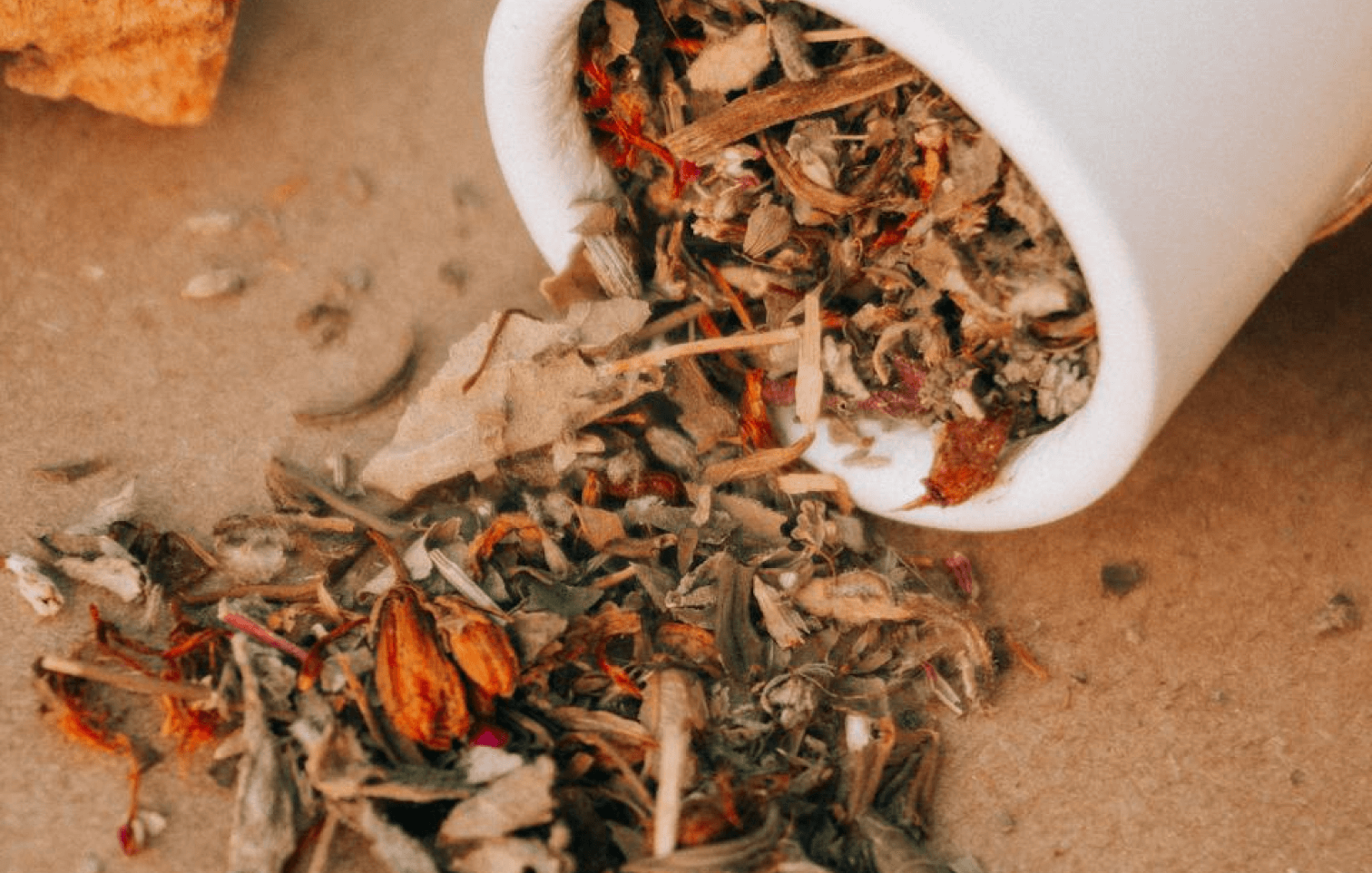Herbs To Boost Immunity: 5 Lesser-Known Founder Faves

No matter how healthy your lifestyle is, we all succumb to acute illnesses now and then (and that’s nothing to be ashamed of!).
In fact, catching the occasional bug offers the body a fantastic opportunity to enhance its adaptive immune response and become stronger and more resilient.
However, even acute illness can become problematic, prolonged, or even complicated if we try to just power through or sit back and do nothing.
This is where proper rest, hydration, and immune-boosting herbs can make all the difference.
We’ve discussed the different remedies and supplements we use when we get sick before, but today, we’re taking a different approach.
In this article, we share five of our favorite immune-boosting herbs, which are lesser known yet widely available (some you’ll even find in your spice cupboard), safe, and effective.
How Do Herbs Boost Immunity?
Various herbs, spices, and plants have been used for centuries to bolster immunity, ward off sickness, and help people get through all types of illnesses.
No matter where you are on the planet, every culture and region has its own rich history of traditional medicine, which includes herbs and plants.
Regarding immunity, different herbs support or “boost” various aspects of immune function based on their active plant compounds and healing properties.
For example, some herbs have antiviral properties while others are expectorants (substances that loosen or break up mucus); some herbs have antibacterial properties, while others help modulate or regulate the inflammatory response, which dictates much of our immune function.
After decades of experience studying and recommending various herbs in practice, I’ve learned that a person could devote their entire life to studying medicinals and only cover a fraction of the plants on this planet.
The good news is, you don’t need a PhD to learn how to use herbs for immunity, nor do you need dozens of different formulas in your cupboard.
Even knowledge of just a few different herbs for immunity, like the ones we’ll discuss today, can make a tremendous difference to your health and health outcomes.
Are Herbs Safe For Everyone?
Herbs are considered foods by the FDA, and herbal supplements are regulated as such.
This means herbal supplement companies must comply with cGMP (current good manufacturing practices) manufacturing standards as set forth by the FDA to ensure quality, safe manufacturing, and authenticity.
Does this mean every company follows these guidelines to the “t”?
Unfortunately not.
Although supplement companies will get shut down if they’re audited and found to be in violation of FDA regulations, not every company adheres to those regulations with equal integrity.
This is why it’s essential you choose herbal supplements from reputable sources who are transparent about their manufacturing practices.
We discuss this more in: Your Quick Guide To Vetting Dietary Supplements.
Taking herbs in sensible quantities, such as what’s recommended on a supplement label or used in a tea, is generally safe for healthy people.
A skilled herbalist, naturopath, acupuncturist, Ayurvedic practitioner, or other health care practitioner trained in herbalism may recommend higher doses for acute illness.
However, some herbs are contraindicated for specific conditions and may interact with certain medications.
Therefore, if you’re taking medications, have a history of allergic reactions to plants, or have a pre-existing health condition, check with your doctor or healthcare practitioner first.
Bear in mind that dosage recommendations on labels are for adults, and children require lower doses.
We discuss specific recommendations for children, including brands we trust, in Our Kids’ Natural Medicine Cabinet.
Immune Boosting Herbs: 5 Lesser Known Founder Faves
We all love the herbal immune-support “celebrities” like elderberry syrup, echinacea, and fire cider.
However, our bodies also benefit from diversity---in nutrition, exercise, and herbal remedies---which is why we like to mix things up.
If you’re used to taking echinacea, for example, at the first sign of a cold, but it’s just not working this time, or you’re fresh out, that’s an excellent opportunity to try something new.
Here are five lesser-known herbs to boost immunity that we love using at home.
1: Thyme
Thyme is not an uncommon herb, yet most people don’t realize this spice pantry staple is incredible for supporting immunity.
Thyme is rich in an active plant compound known as thymol, which has been shown to have significant antiviral, anti-inflammatory, and immune-regulating properties.[1] [2]
It can also be helpful for coughs and supporting respiratory function.[3]
Thyme tea is an excellent first line of defense when you feel sickness coming on and can help your body battle an existing illness.
Thyme Tea Recipe
To make thyme tea:
- Steep 1-3 teaspoons of dried thyme or several sprigs of fresh thyme in boiling water for 5-10 minutes.
- Sweeten with raw honey and add lemon if desired.
If the taste of the thyme is too strong, you can cut it with a more mild herb like chamomile, lemon balm, or cinnamon.
2: Mullein
Mullein grows wild on roadsides in many parts of the United States and has a long history of use in North America and Spain as an expectorant and respiratory support herb.
Emerging research has begun to confirm these traditional uses, showing mullein contains various active plant compounds capable of supporting immunity, respiratory health, and inflammatory response.[4] [5]
For this reason, you’ll often find mullein in cough syrups and immune/respiratory support herbal formulas.
It’s also a staple in many ear oils designed to soothe, decongest, and heal ear infections.
Mullein is one of our favorites for congestion or stubborn coughs and can be taken as a tea or tincture in water or juice.
3: Lemon Balm
Lemon balm is a common ingredient in herbal tea blends and a well-known nootropic, a type of herb known to support brain health.
What’s less known is that it is an immune-boosting powerhouse and a great-tasting option for children or anyone who has trouble with strong-tasting herbs.
Research has shown lemon balm has impressive antiviral and immune-regulating properties. It is especially helpful for cold sores and other forms of herpes virus when used topically and/or taken internally.[6] [7]
This makes it a wonderful herbal ally to turn to whenever you’re feeling run down, exhausted, or depleted.
Lemon balm also has mild sedative properties, making it a welcomed herb to help with sleep when you’re feeling under the weather or wired and tired.
Its mild lemony flavor makes it a hit with children, either as a tea or tincture hidden in juice or as a base for throat-soothing, hydrating, and cooling lemon balm, elderberry, and honey popsicle.
Lemon balm is available as a tincture, tea, capsule, or bulk herb.
Lemon balm can be taken in larger doses to help with acute illness (check with your practitioner about the appropriate dose) or enjoyed long-term to help with persistent issues, like cold sores or other viral infections.
Try adding it to green tea for a flavorful and healthful pick-me-up or morning brew.
For cold sores, make a strong tea and apply topically and take it internally as a tea or tincture for best results.
4: Cat’s Claw
It may sound like an ingredient in a witch’s brew, but Cat’s Claw is an Amazonian herb well-known for its immune-boosting benefits.
Also known as “the life-giving vine,” the name comes from the plant's shape, which resembles a sharp cat’s claw.
Cat’s claw is a bright orangey red color, astringent tasting, and has a rich history of use in traditional South and Central American medicine for various health issues, including asthma, abscesses, fever, urinary tract infections, viral infections, and wounds.[8]
It’s also one of the most popular herbal remedies in the United States.
Although research on cat’s claw is in its infancy, it’s widely used in integrative medicine, and studies have shown it has immune-stimulating, antimicrobial, inflammatory-regulating (it may calm or rev up inflammatory response as needed), and anti-cancer properties as well as brain health benefits.[9] [10] [11] [12]
Cat’s claw can be found as a tincture, capsule, and in teas and, as an Amazonian herb, should be sustainably sourced or organically grown.
Try taking cat’s claw at the first sign of sickness and continue until symptoms are gone. It can also be combined with other herbs for added benefits.
5: Goldenseal
When you’re in need of strong immune support or really can’t afford to get sick, consider Goldenseal as a short-term solution.
Goldenseal is native to Eastern North America, and its traditional uses for health and as a dye were passed down from Native Americans.
Goldenseal is high in an active plant compound known as berberine, which is responsible for much of its immune boosting and inflammation-regulating benefits.
It was traditionally used for ailments of the eyes, digestion, heart, immune system, respiratory system, and skin.[13]
Today, Goldenseal is used in various herbal formulas targeting immune, respiratory, and metabolic function. It’s also been shown to be beneficial for the gut microbiome, which plays a primary role in immunity.[14] [15] [16]
Its high concentration of berberines makes it a powerful immune booster and regulator, and as such, it is typically recommended for short-term use of one to two weeks at a time.
This makes it an excellent remedy to turn to for acute illnesses like cold and flu, especially if respiratory issues are becoming problematic.
It may also be recommended for chronic issues, but your healthcare practitioner would need to set and monitor the dosage.
Goldenseal has a very bitter flavor, so most people prefer to take it as a capsule rather than a tincture, although the tinctures can work a little faster.
Other Ways To Boost Immunity Naturally
Immune-boosting herbs are incredible allies for helping you get through illness with minimal suffering and/or complications.
However, herbs—or any supplements—should not be considered a substitute for a healthy immune-supportive lifestyle, which includes:
- Eating a healthy, whole foods-based diet with plenty of organic fruits, vegetables, gluten-free grains, broths, proteins, and healthy fats.
- Staying hydrated with the best quality water you can get.
- Tending indoor air quality at home by removing harmful household products (cleaners, personal care, fragrance, pesticides, etc.) and replacing them with healthier alternatives, opening windows, HEPA vacuuming, regular dusting, opening windows, using an air purifier, and improving ventilation.
- Spending time outdoors getting natural sunlight, grounding, and breathing fresh air.
- Keeping stress in check because our thoughts and emotions greatly affect our immunity.
- Getting regular exercise by doing activities you enjoy.
- Getting enough sleep, which means a minimum of 7 ½ - 9 hours. Sleep is paramount to immune system function, so do not skip this step (even if it means napping when the baby or kids nap).
You can learn more about these immune-boosting practices by clicking the links above.
Wondering what herbal supplement brands to use? Check out Your Quick Guide To Vetting Dietary Supplements to learn about some of our most trusted brands.
One of the most under-valued ways to boost immunity is to improve indoor air quality by removing toxic household products and switching to human-safe cleaners.
Branch Basics was created for this reason!
Our all-in-one plant- and mineral-based, Made Safe Certified, and cruelty-free Concentrate was designed to replace every single cleaner and laundry product in the home.
Just add water to create enough All-Purpose, Bathroom, Streak-Free, Foaming Wash, Laundry, and custom cleaners to last for months.
Branch Basics is safe for even the most sensitive individuals, including babies, toddlers, children, the immune-compromised, and pets.
It’s also super effective, naturally fragrance-free, 100% biodegradable, and affordable.
For more immune-boosting and natural sanitizing tips, check out the following articles:
- How To Avoid Cold & Flu This Season
- 7 Immune-Boosting Herbs & Spices In Your Pantry
- How To Naturally Disinfect Surfaces
- 8 Ways To Support Your Immune System When You Get Sick
- 9 Natural Alternatives To Bleach For Disinfecting
References mentioned in this article:
1: https://www.ncbi.nlm.nih.gov/pubmed/28886313
2: https://www.ncbi.nlm.nih.gov/pubmed/30551467
3: https://pubmed.ncbi.nlm.nih.gov/28214817/
5: https://pmc.ncbi.nlm.nih.gov/articles/PMC8301161/
6: https://www.sciencedirect.com/science/article/pii/S1756464622001785
7: https://pubmed.ncbi.nlm.nih.gov/19023806/
8: https://www.mdpi.com/2076-3417/10/8/2668
9: https://academic.oup.com/ajhp/article-abstract/66/11/992/5130270?login=false
10: https://pubmed.ncbi.nlm.nih.gov/11515716/
11.https://www.huhs.edu/literature/Cat's%20Claw.pdf
12: https://pmc.ncbi.nlm.nih.gov/articles/PMC6365538/
13: https://pubmed.ncbi.nlm.nih.gov/37729210/
14. https://pubmed.ncbi.nlm.nih.gov/33118480/
15: https://www.ncbi.nlm.nih.gov/books/NBK350390/
16: https://pmc.ncbi.nlm.nih.gov/articles/PMC8285933/
Categories

Marilee Nelson
Marilee Nelson is an Environmental Toxins expert who has spent nearly 30 years advocating for the chemically-sensitive and chronically-ill. She is a Board Certified Nutritionist, Certified Bau-Biologist and Bau-Biology Inspector and specializes in Food As Medicine. She has helped thousands of families and individuals identify, heal and recover from toxic exposures and is on a mission to revolutionize the way American families view their health.







